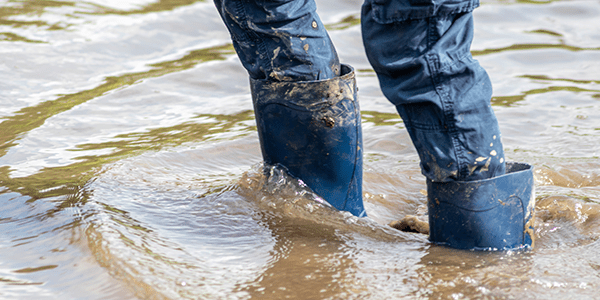Flood & Earthquake Insurance 101
The basics when preparing for natural disasters

 When it comes to flood and earthquake insurance, preparation is key to making sure you and your property are protected. Flood and earthquake insurance are generally not covered by your homeowners or renters insurance policy, however these supplemental insurance policies and endorsements help give you the peace of mind to know that if any of these types of events happen, you are covered. Now is a great time to review your policy’s details with your agent, and make changes as needed for your home’s unique location and situation.
When it comes to flood and earthquake insurance, preparation is key to making sure you and your property are protected. Flood and earthquake insurance are generally not covered by your homeowners or renters insurance policy, however these supplemental insurance policies and endorsements help give you the peace of mind to know that if any of these types of events happen, you are covered. Now is a great time to review your policy’s details with your agent, and make changes as needed for your home’s unique location and situation. Flood Insurance
You’ve probably heard this horror story before—someone loses a home due to a flood, and learns after the fact that standard homeowners insurance doesn’t cover flood damage. Even if you don’t live or work in a flood zone, flood insurance offers protection in the event that a flood does occur.
Because very few companies offer flood insurance, the National Flood Insurance Program (NFIP) was created by the U.S. government in 1968 and is available to homeowners, renters and business owners in communities with proper floodplain management. This type of insurance is often required to obtain a mortgage in areas of high risk of flooding however, according to the NFIP nearly 25% of the program’s claims occur in moderate-to-low-risk areas.
Flood insurance offered by the NFIP has coverage options for both the structure and its contents. Coverage for contents is optional for some policies, so be sure to talk to your agent for specifics on your exact plan.
It should be noted that flood insurance does not take effect the next day, but typically has a 30-60 day waiting period. There are exceptions to this rule, usually when insurance is required by a lender in the process of procuring a mortgage.
What it doesn’t cover
Government-issued flood insurance through NFIP does not cover:- Buildings entirely over water or principally below ground
- Gas and liquid storage tanks
- Animals
- Aircraft
- Wharves, piers and bulkheads
- Growing crops and shrubbery
- Land and roads
- Machinery or equipment out in the open
- Most motor vehicles
If you are looking for flood insurance options that cover anything listed above, be sure to call your First Tech Insurance Services agent for other policy options.
Flooding can cause emotional stress along with physical hazards, so be mindful of the well-being of you and your family during the aftermath. For more information about the NFIP and flood insurance, feel free to give us a call, or visit the NFIP website, where you can find lots of answers to common questions.
Earthquake Insurance
Earthquakes have occurred in 39 of 50 states since 1900, and 90% of Americans live in areas that are considered “seismically active.” Depending on what region of the U.S. you live in, there is a 40-70% chance that a major earthquake could happen in the next 15-30 years.
When it comes to earthquake insurance, it’s important to keep in mind that most homeowners insurance policies do not cover earthquake damage and even if you don’t live in an area where earthquakes are common, you may still want to consider adding this endorsement to your existing homeowners or renters insurance policy.
What it covers
In the event that an earthquake causes damage to your home, you’ll want to make sure that your policy covers any other structures on your property (like a detached garage, shop or outbuilding), the contents of your home, and additional living expenses that are required if your home is badly damaged or destroyed. Keep in mind that limitations in coverage do exist, and a deductible usually applies before your insurance kicks in to help pay for expenses. Be sure to talk to your First Tech Insurance Agent to make sure you are properly covered. If you experience damages or losses due to a landslide, settlement, mudflow, or the rising, sinking and contracting of earth, you may be covered by your earthquake insurance endorsement if the damage resulted from an earthquake.
What it doesn’t cover
Earthquake insurance does not provide coverage for damages or losses in the event that an earthquake causes or is compounded with a flood or tidal wave. Talk to your First Tech Insurance Agent for more details on what is or isn’t covered by your specific earthquake insurance endorsement.
If a flood or an earthquake occurs…
There are tons of resources to help make sure you are prepared in the event that a flood or earthquake happens. Your local radio or television station will have the most updated information for your area and can help you find resources in case of emergency.
Being prepared is the best way to stay safe in the event of a major disaster. For more information about preparing and staying safe before, during and after a flood, earthquake, or any other disaster or emergency situation, visit ready.gov.
Contact the First Tech Insurance Services agent in your area or call 855.855.8805 to get started. They’ll help you balance cost and coverage, so you can relax and enjoy whatever moves you.